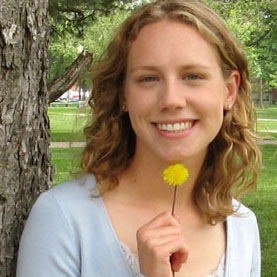

Venture Boldly

Office of Communications
2 East South Street
Galesburg, IL 61401

 While Knox College senior Chelsea Bagot was growing up in Long Grove, Illinois, she seemed like most girls. She says she always had an interest in nature and fondly remembers the tranquility of horseback riding. Now she searches the horizon for invading species. So how far off the mark is this outdoors-kind-of-girl who wanted to be an outreach ecologist?
While Knox College senior Chelsea Bagot was growing up in Long Grove, Illinois, she seemed like most girls. She says she always had an interest in nature and fondly remembers the tranquility of horseback riding. Now she searches the horizon for invading species. So how far off the mark is this outdoors-kind-of-girl who wanted to be an outreach ecologist?
She did not fall far from the tree
These invasive species have nothing to do with aliens from another planet and Chelsea's College Honors project, "Altered Landscapes, Altered Viewpoints: Civilization, Wilderness, and the Foundations of Modern Ecology," is anything but out of this world.
As Chelsea puts it, invasive species are plants that invade areas where they are not among the native flora and fauna. Most people with an untrained eye know them as 'weeds.' They spread prolifically, and even the casual weekend gardener knows they can be a very big problem.
Killer algae and sudden oak death may not be the makings of a Hollywood thriller, but as Bagot points out, these invasive species pose a genuine threat to the environment and economy. "They can upset the ecological balance to properties," she says.
In her Honors project, Chelsea weeded through crops of information about herbicides and their alternatives. Some might think that farmers, gardeners, and botanists should simply pick up a jug of their favorite herbicide, point the nozzle at the infestations and shoot. But, Chelsea points out, those herbicides can impact other plants and impact humans. "The prolonged exposure of chemicals can affect the health of field workers, and the prolonged use of chemical control is expensive and may be ineffective when targeted plants evolve and become resistant to the chemicals," she adds.
So how do you protect the environment without destroying it? "Restoration ecology is an environmentally sound way to control invasive species with minimal expense, allow the survival of non-target organisms, and have positive implications for the people who work in these environments," she says.
Chelsea's research focused on ecology versus toxicology. "There was not a lot of information on this topic. There are no traditional journals of how herbicides affect worker health," she says. "I think the environmental movement can be stronger if ecologists and toxicologists talk to each other about the issues that each is facing in their different types of environmental work."
She dug deeper
Inspired with a curiosity of the health affects of chemicals on people, Chelsea says she thought, "why not do something bigger. I'm going to be working as an ecologist after Knox, so I know how important it is to have synthesized and concise information."
"The most valuable thing that I found was the things that I didn't find. That is, I couldn't find any other research on the use of herbicides in restoration evaluated as an ethical question," she says. "I was surprised that it seems no one else has looked at this because I think it is an interesting area that could really spike debate."
Chelsea followed a lead to the University of Wisconsin's Arboretum in Madison. "I didn't find the type of information I was looking for in the detail I expected," she says. Chelsea ended up modifying the outline of her paper because the research she expected to gain there did not come through. "The documents just didn't say the concrete things I thought they would," she says. "It was both nerve-wracking and really exciting to not find things because then I was like 'hey, maybe I really am on to something original here'."
Chelsea has blossomed while at Knox. "I am a lot more self reliant. I talk to my professors as adults. They take my ideas seriously and make a real effort to give me the opportunity to explore new things," she says. She also flourished on the track team and was involved with KARES (Knox Advocates for Recycling and Environmental Support), and helped establish Eco House. "I am happy that Eco House is permanent. Knox has a student body that cares, that has an active interest about the environment," she says. During her first year at Knox College, Chelsea was one of 12 students that participated in the Green Oaks Term at Knox's Green Oaks Biological Field Station. "That is true restorative ecology," she adds.
Chelsea's roots
Chelsea is a 2003 graduate of Adlai E. Stevenson High School in Lincolnshire, Illinois. An Environmental Studies and Biology major, she decided to pursue this Honors project at the end of her junior year. "Why not do something bigger. I just feel really lucky to have had an opportunity like this as an undergraduate. I feel like I had the chance to really direct my own learning and decide where I wanted to go, but I still had the consistent support of great faculty members who really cared about what I was doing."
Published on May 30, 2007